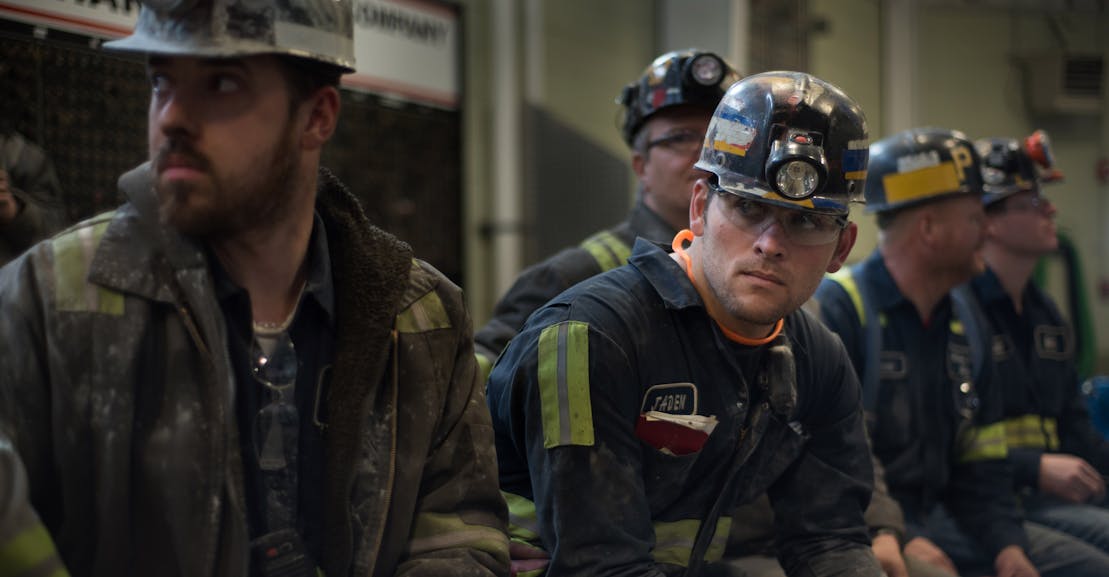
Clean energy companies can certainly do much better by their workers, and climate campaigners shouldn’t labor under the assumption that they’re necessarily progressive institutions: The fact that they’re producing clean power instead of digging up fossil fuels doesn’t make them any less likely to exploit their workers. Renewables companies are, after all, companies with a profit motive just like any other, and have seen their most rapid growth after decades of assaults on organized labor through public policy. Last year, the solar firm Bright Power fired its solar installation team in what dismissed workers allege was retaliation for their unionization efforts. Working conditions also vary widely based on the type of work being done, and who’s doing it. Residential rooftop solar in particular tends to be non-union, while utility-scale solar—done by unionized utility workers—often comes with better wages and working conditions.
Fossil fuel companies, however, aren’t the worker-friendly safe havens that critics of green energy would have you believe, either. For decades, coal mines and oil refineries were sites of brutal and often bloody fights for unionization and to change some of the country’s worst working conditions. Well into the 20th century, workers in coal camps throughout Appalachia were paid in company scrip, and children descended deep underground in toxic conditions. Organizers were murdered in broad daylight by company thugs, and companies went to great lengths to break up solidarity among broadly multiracial workforces by sewing division among white, black and immigrant miners. Like much of corporate America, fossil fuel companies spent most of the postwar era trying to break up unions, and—as current unionization rates can attest—were largely successful.
In more recent years, fossil fuel executives have used bankruptcy filings to tear up collective bargaining agreements and short workers on their healthcare and pensions, all the while ensuring executives are come out with bonuses. And as The New York Times reported recently, many fossil fuel companies are shirking responsibilities to clean up abandoned wells leaking prodigious amounts of heat-trapping methane and other toxins into the atmosphere and surrounding communities. Such remediation work could furnish jobs for these companies’ laid-off workers. Instead, hundreds of thousands of workers are already losing work with no plan for what comes next.
One way to ensure clean energy jobs offer fair conditions and wages is to have them offered through the public sector, where average unionization rates are five times higher than in the private sector. “It’s much easier to put in wage requirements and Project Labor Agreements,” said J. Mijin Cha, Assistant Professor of Urban and Environmental Economics at Occidental College, and a co-author of recent proposal for a Green Stimulus in response to the Covid-19-induced recession. “If we think about doing really big public projects, doing as much through the public sector is best for job standards and job quality.” Cha points as well to the potential for sectoral bargaining in clean energy, which would set baseline wages and benefits provisions regardless of whether work was happening at the residential or commercial level. Larger public-led home retrofitting projects, as well, could make energy efficiency work a more attractive for union contractors.
Green jobs also don’t end in the power sector. “We’re in this moment where we’re thinking a lot bigger about the type of economy we need to survive in the long term, especially in light of the pandemic,” Amanda Novello, Senior Policy Associate at The Century Foundation, told me. “Within this context, there’s definitely space to think more broadly about the definition of green jobs, and broaden people’s horizons beyond solar installers and wind turbine technicians. If you counted healthcare, teaching or childcare as green jobs then you would have a very different picture of unionization in green jobs.”
Decarbonizing the United States as rapidly as scientists say is necessary to avert catastrophe will involve disruption. But painting green jobs as inherently worse than fossil fuel jobs—even going by current numbers—is dishonest. And punting a transition off of fossil fuels down the line doesn’t reckon with the reality that workers are already being unjustly transitioned out of fossil fuels, with a threadbare safety net to catch them.
No unionization numbers are fully static. Where high wages and strong union contracts in the coal, oil and gas industry exist at all, they weren’t won without a fight, and won’t come easy in wind and solar, either. What an economy in transition looks like is still very much up for discussion. Fatalism about the quality of low-carbon work leaves the keys to the future of clean energy in the bosses’ hands.
"fuel" - Google News
July 21, 2020 at 05:01PM
https://ift.tt/3jovca4
Green Jobs Can Be Just as Good as Fossil Fuel Jobs - The New Republic
"fuel" - Google News
https://ift.tt/2WjmVcZ
Bagikan Berita Ini














0 Response to "Green Jobs Can Be Just as Good as Fossil Fuel Jobs - The New Republic"
Post a Comment